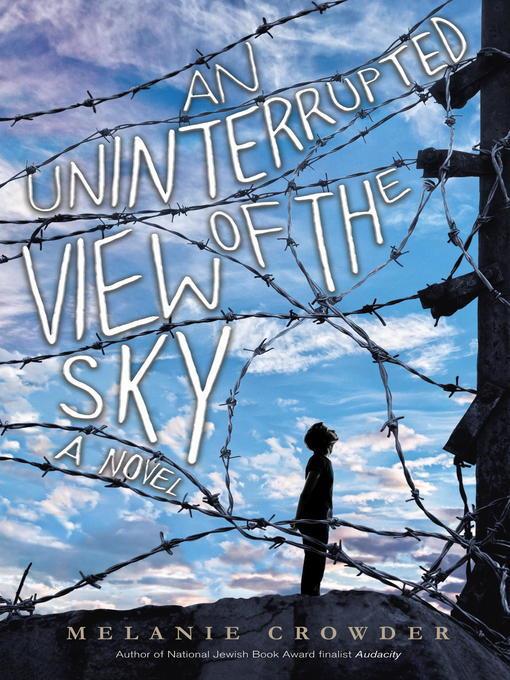
An Uninterrupted View of the Sky
فرمت کتاب
ebook
تاریخ انتشار
2017
Lexile Score
770
Reading Level
3-4
ATOS
5
Interest Level
6-12(MG+)
نویسنده
Melanie Crowderشابک
9780698175600
کتاب های مرتبط
- اطلاعات
- نقد و بررسی
- دیدگاه کاربران
نقد و بررسی

Starred review from May 1, 2017
Righteous anger, heartache, and desperation transform 17-year-old Francisco from a half-hearted student who’s more interested in pick-up soccer games than academics into a young man who realizes that education provides the only opportunity to rescue his family from an unjust political system. Set in 1999 Bolivia, the story quickly establishes the implicit social prejudices infiltrating Francisco’s country: “Light-skinned mestizos work in the banks.... Dark-skinned Aymaras and Quechuas work in the cancha and the fields and the mines. And then there’s me, stuck somewhere in between.” When the authorities imprison Francisco’s taxi-driver father for running out of gas, his mother, assessing the situation as hopeless, abandons him and his sister to the dangerous prison. Although still rebellious, Francisco is inspired by his father’s unwavering hopes for his children’s future, and their renewed communications through poetry leaves him determined to seize any opportunity to help his family. Crowder (Audacity) delivers a disturbing portrait of innocent families trapped in corrupt systems, as well as a testament to the strength of enduring cultural traditions and the possibility of finding family in the unlikeliest places. Ages 12–up. Agent: Ammi-Joan Paquette, Erin Murphy Literary.

Starred review from May 15, 2017
Francisco, a middle-class Bolivian high school senior, and his younger sister must move into a dangerous prison after their indigenous father is wrongfully arrested. Inspired by real events, according to an author's note, Francisco's tale is set in 1999 in Cochabamba, Bolivia. The 17-year-old son of a light-skinned, college-educated mestiza and an indigenous taxi-driver father, Francisco is smart but hot-tempered. He knows he's privileged enough to go to high school and play pick-up soccer with friends instead of having to work, but he's also painfully aware that's he's too short and dark (unlike his fair Mama and 12-year-old sister, Pilar) to be taken seriously by Bolivia's white elites, who don't see beyond his dark skin and Aymara face. Francisco's life takes an irreversible turn when Papa is falsely arrested under "the 1008," a draconian drug law. An unimaginable betrayal leaves Francisco and Pilar no choice but to live in San Sebastian prison, which permits inmates' spouses and underage children to reside inside. Readers will feel utterly invested in Francisco's various challenges: protecting his sister from prying eyes; worrying about his gentle, poetic father in a tough, soul-sucking place; finishing high school; and figuring out whether to take Pilar to their peasant grandparents' Andean village on the Altiplano (high plains). There's also a sweet, slow-burning romance between Francisco and a quiet young woman with a hidden ferocity that terrifies, enthralls, and inspires him to write Neruda-esque poetry. A riveting, Dickensian tale set in 1990s Bolivia. (glossary, selected sources) (Historical fiction. 12-17)
COPYRIGHT(2017) Kirkus Reviews, ALL RIGHTS RESERVED.

Starred review from May 1, 2017
Gr 7 Up-Seventeen-year-old Francisco wears violent anger just under his skin, despite a tranquil life with his parents and eight-year-old sister in Cochabamba, Bolivia, in 1999. He and his family are irrevocably affected by Law 1008, a statute initiated in response to U.S. threats of economic sanctions, which seeks to find and imprison individuals connected to coca production. Francisco's father, a taxi driver, is arrested while taking gasoline to his stopped car, charged with the intention of making cocaine with the gas, and placed in an overcrowded, dangerous men's prison. His mother visits with the children and without warning deserts them there, leaving Francisco feeling gutted. He assumes the role of primary caregiver for his sister, transporting her to and from school and the prison where they must now live. Always at odds with his father over his studies and future goals, Francisco promises to graduate from high school to give the man some hope, despite knowing that his own dark skin and short stature seal his fate in a stratified Bolivian society where the indigenous remain poor and victimized. Themes of poverty, social injustice based on ethnicity, violence toward women, coming-of-age, romantic love, and a sliver of precarious hope are woven into the plot. VERDICT This poetic, historical novel is an important addition to libraries given its focus on the consequences of U.S. involvement in Bolivian politics.-Ruth Quiroa, National Louis University, Lisle, IL
Copyright 2017 School Library Journal, LLC Used with permission.

April 15, 2017
Grades 9-12 In Bolivia, Francisco is itching to finish high school, but all his plans come to an abrupt halt when his indigenous father is arrested on false charges, and he and his little sister are forced to live in the cramped, filthy prison with him. Though they can leave for school, every day is a struggle to scrounge up enough money for food, a mattress, and a cell, all while protecting themselves against dangerous criminals in the prison. Informed by Crowder's experience in South America in the late 1990s, this trenchant novel explores the result of a corrupt Bolivian law enacted as part of the U.S. war on drugs, which disproportionately affected poor, uneducated, and indigenous populations. Francisco narrates the tale, and his anguish over the conditions in the prison and his panic over protecting both his father and sister come through in both his visceral language and the poems he writes for a school project. This hard-hitting, ultimately hopeful story will open readers' eyes to a lesser-known historical moment and the far-reaching implications of U.S. policy.(Reprinted with permission of Booklist, copyright 2017, American Library Association.)

























دیدگاه کاربران